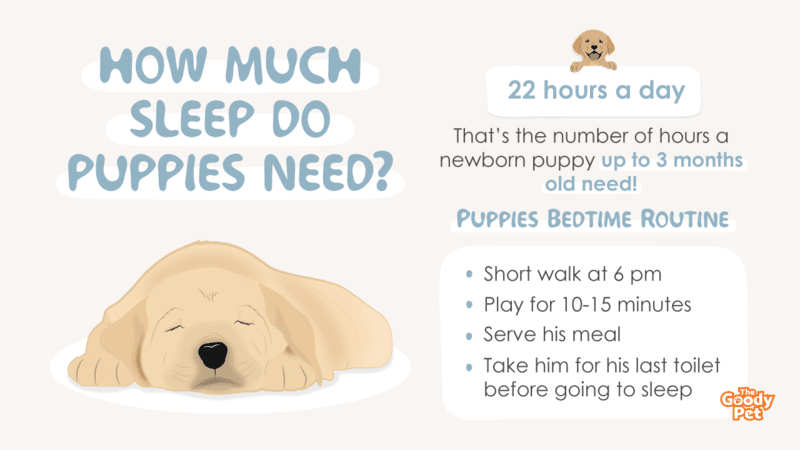Do you have a new puppy? If so, you’re probably wondering how much sleep your little ball of fur needs. Puppies are notorious for being active and playful, but they do need their rest.
Veterinarians say that most newborn puppies need to sleep for 16-20 hours per day. As they grow older, they will need lesser sleep, between 12-16 hours per day. This varies depending on the breed, temperament, and exercise levels of the puppy. Puppies usually nap frequently during the day and sleep for longer periods at night.
So whether you’re just starting out as a dog parent or you’re looking for ways to help your restless puppy sleep better, read on for insights from the experts!
How Many Hours Of Sleep Does A Puppy Need?
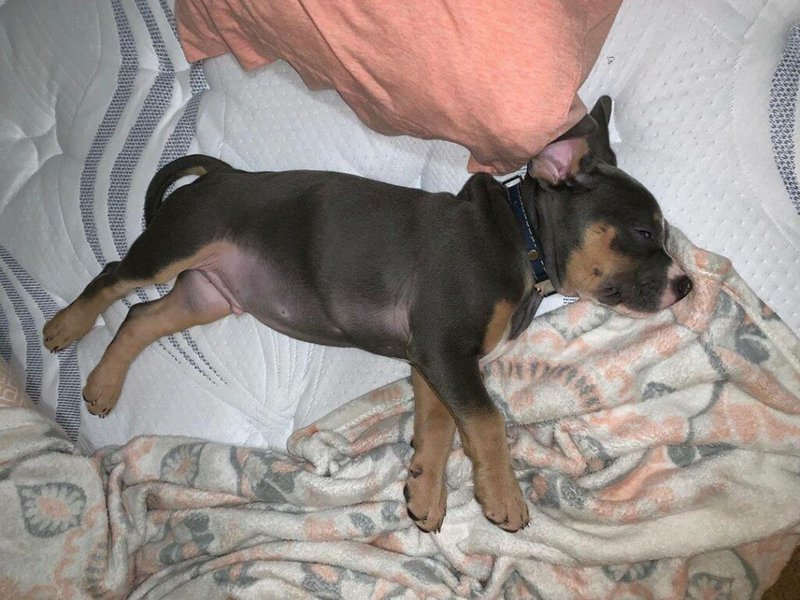
The number of hours a puppy needs to sleep in a day depends on several factors such as age, size, activities, and breed.
A newborn puppy up to 3 months of age sleep for 22 hours a day. The remaining two hours are for eating and other activities. Here’s a compiled list of wet and dry dog food that is recommended for your new puppy.
Once they get a little bit older, the puppy will start developing other skills, like walking and eating solid foods. During this phase, they are more energetic to explore their surroundings and walk around, but still, they sleep most of the time.
The puppies will develop fast throughout their first year. Their energy level increases. According to American Kennel Club, puppies typically need around 15 to 20 hours of sleep. This time their sleeping pattern will be different. They will have small naps after an energetic activity and more at night.
Tips On Puppy Sleep
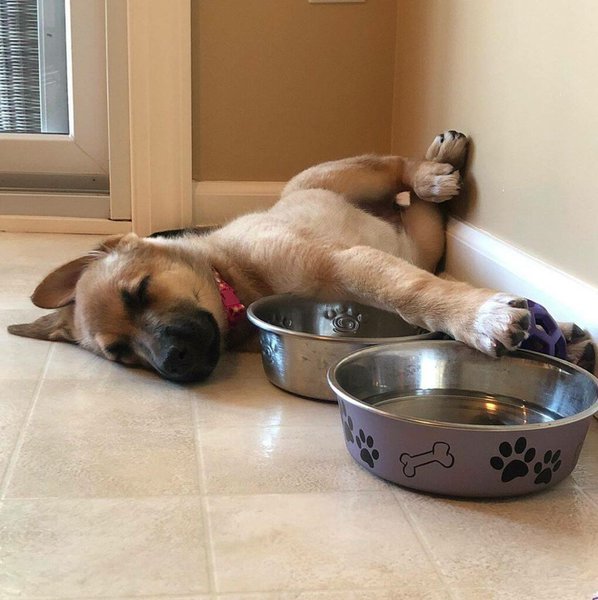
Getting a checklist of puppy items for new puppy parents is extremely important. This ensures that you are ready for the next few months of your puppy’s growth cycle.
Putting your puppy to sleep at night is as difficult as with a newborn baby. To help your little pup go to sleep fast, you need to create a good sleeping environment.
And how will you do it? Here are some tips you can consider:
Just like babies, it is much easier for your puppies to go to sleep if you set an excellent sleeping atmosphere. It does not matter where you will position your puppy’s bed; make sure that the place is comfortable and relaxing.
The light should be not too bright and not too dark; a bit dimmer is appropriate. If there is a bright light coming from the sunlight or street lights, it is best to put thick curtains on your window.
Make sure the room is free from any noise; this will put your puppy to sleep. You can play some soft classical music to set the mood. If your puppy is undergoing crate training, position his bed close to your bed at night. By doing this, you will have an idea of when your puppy wakes up to go to the bathroom.
Creating A Bedtime Routine Is Important
Some new pet owners are not aware that they should set a bedtime routine for their puppy. If it fits your lifestyle, you can consider the schedule below:
Take your puppy for a short walk at 6 pm. Let him play for 10 to 15 minutes. Serve his last meal for the day afterward. Bring him again outside for his last toilet before going to sleep.
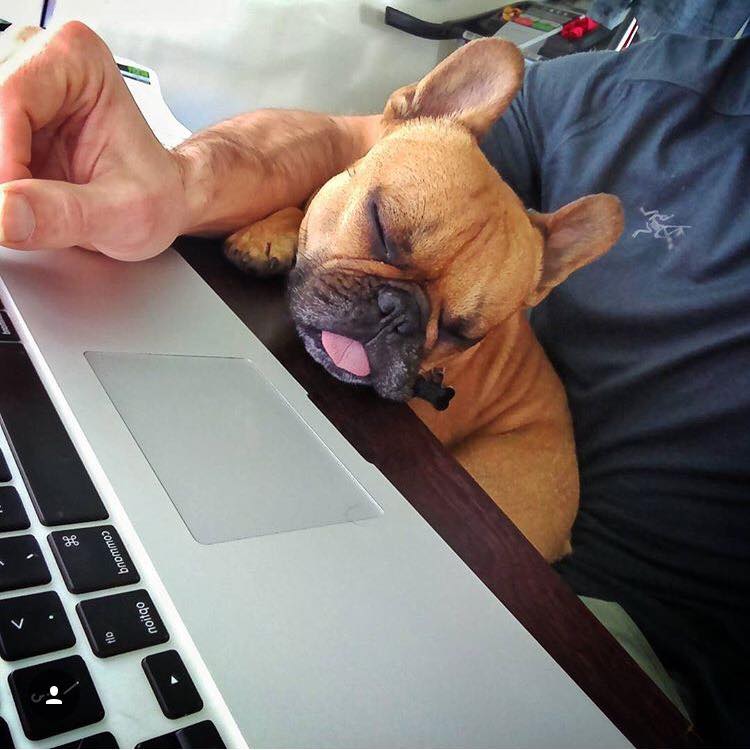
Prepare the beddings and put your puppy to bed; make sure that he sleeps alone in his place and not on your lap. Before you go to bed, wake your little pup for his last toilet visit, then back to bed. He might not be able to sleep right away, but when left alone, he will surely get back to sleep. You can take your puppy in the toilet twice, but make sure to do it quietly and bring him back to his bed after peeing.
Prepare his breakfast in the morning, and you can wake him up between 6 to 7 am. A 12-hour sleep at night is perfect for your little pup. During the daytime, your puppy needs to take his nap for 6 to 8 hours alone on his bed.
Sleeping Hours Of Puppies According To Age
As mentioned earlier, the sleeping hours of puppies may vary depending on their breeds, activities, and age. Below are the usual sleeping hours of puppies according to their age:
- Puppies between 0 to 7 weeks sleep 22 hours a day. The remaining two hours are for feeding and other activities.
- Puppies between 8 to 10 weeks need to sleep for 14 to 16 hours at night and 4 hours for day naps. The remaining 4 hours are for eating and other activities.
- Puppies between 10 to 12 weeks (3 months) still need to sleep more, but this time, they can have other activities like walking on their own playing, and they should start the potty training.
- Puppies at four months and older can have less sleep since they are now engaged in more activities. However, you need to train them how to be alone. During this stage, they may feel lonely when everybody is out. Let them feel that it is okay to be alone for some time.
As your puppies grow older, you need to schedule their activities to ensure that everything they need is provided. Set time for everything they need to do, like time for feeding, playing, bathroom breaks, and for sleeping.
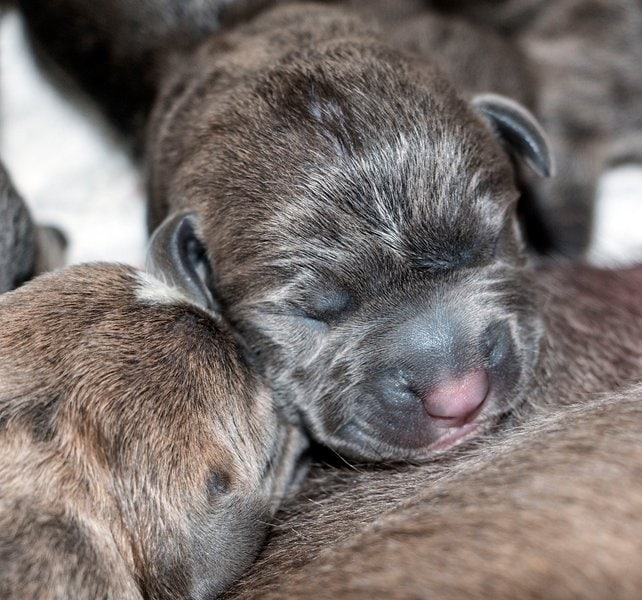
You can follow this routine as suggested by American Kennel Club:
- Puppies wake up at around 6 to 7 am, and take him out for a bathroom trip.
- Let him take his breakfast.
- Bring him out again for a potty break as puppies need to relieve themselves after eating.
- They can play, walk or have social time for one hour.
- Encourage him to sleep in his sleeping area for an hour to two hours nap.
- When he wakes up, bring him out again for a potty break.
- Lunchtime.
- Bathroom break.
- You can play with him and let him explore his surroundings.
- He can have another nap time again.
- When he wakes up, take him out again for a bathroom break.
- Then playtime again. Once he gets tired, let him settle for another nap.
- Potty break.
- The evening routine is somewhat similar to the morning routine except that this time he should go to sleep for 8 to 12 hours with a quick bathroom trip before bed and one in the middle of the night.
Final Thoughts
Keep in mind your puppy’s health depends on several factors – diet, exercise, and sleep. Puppies need a lot of sleep. Do not disturb your puppies’ sleeping habits. But if your puppy is sleeping too much, it is best that you bring him to the vet to check what might cause it.

